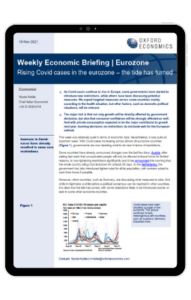Eurozone weekly economic briefing | Rising Covid cases in the eurozone – the tide has turned

As Covid cases continue to rise in Europe, some governments have started to introduce new restrictions, while others have been discussing potential measures. We expect targeted measures across some countries mainly according to the health situation, but other factors, such as domestic political situations, will be relevant.
What you will learn:
- The major risk is that not only growth will be directly affected by government decisions, but also that consumer confidence will be strongly affected as well.
- With private consumption expected to be the major contributor to growth next year, looming decisions on restrictions do not bode well for the European outlook.
- Our view, outlined in a recent Research Briefing, continues to be that inflation remains contained over the coming years, unless growth is stronger or commodity prices are higher than expected.
{% video_player “embed_player” overrideable=False, type=’scriptV4′, hide_playlist=True, viral_sharing=False, embed_button=False, autoplay=False, hidden_controls=False, loop=False, muted=False, full_width=False, width=’1920′, height=’1080′, player_id=’60101440895′, style=” %}
Tags:
Related Services

Post
Food prices to bottom out in 2024, risks skewed to upside
Our baseline forecast is for world food commodity prices to register an annual decline this year, in aggregate, reducing pressure on food retail prices further downstream. However, we believe the risks to this forecast are overwhelmingly skewed to the upside.
Find Out More
Post
Battery raw material prices to recover
Battery raw materials prices bottomed out last quarter and we think a sustained recovery is looming. Midstream EV battery manufacturing activity has picked up again and inventories have returned to historical levels, suggesting upstream demand for raw materials will also bounce back.
Find Out More